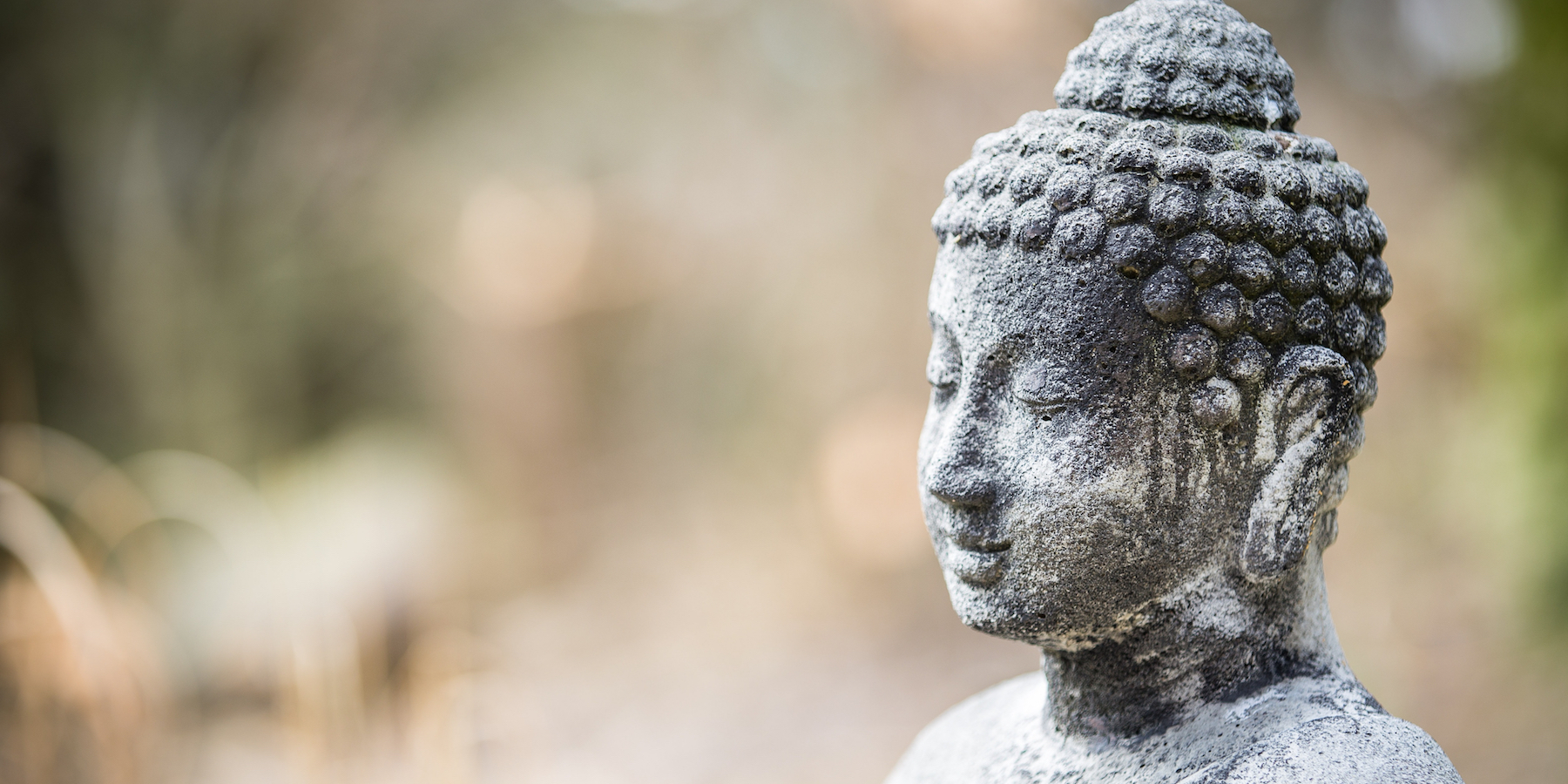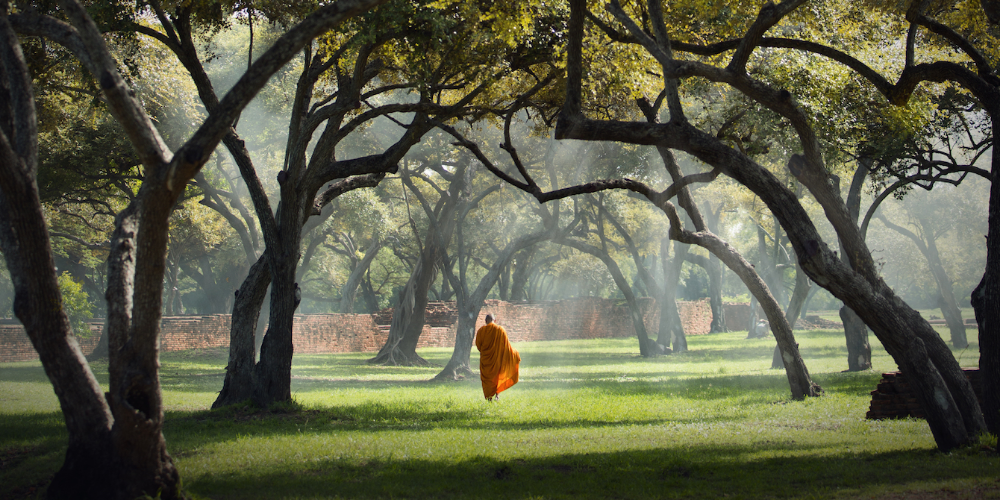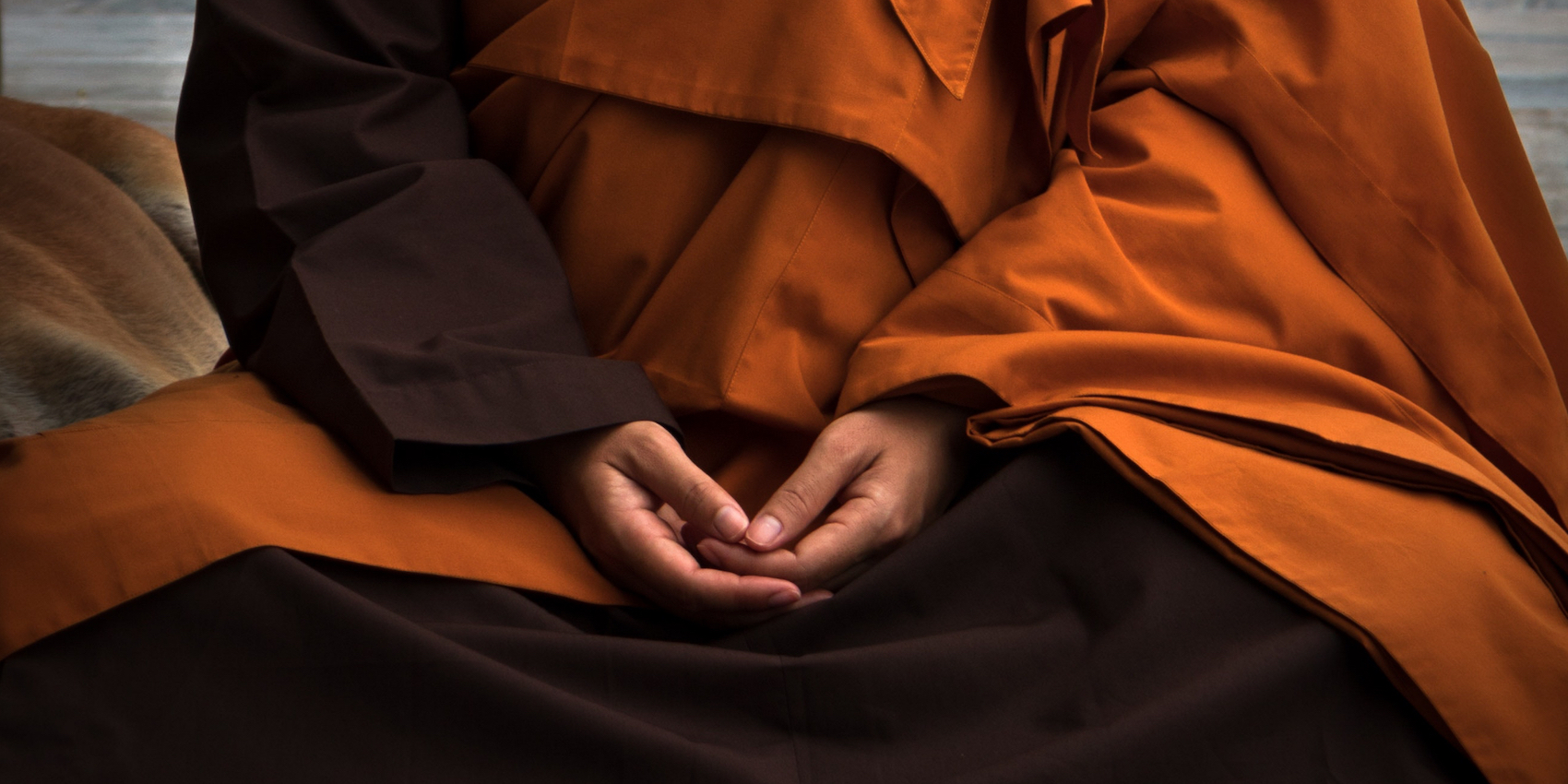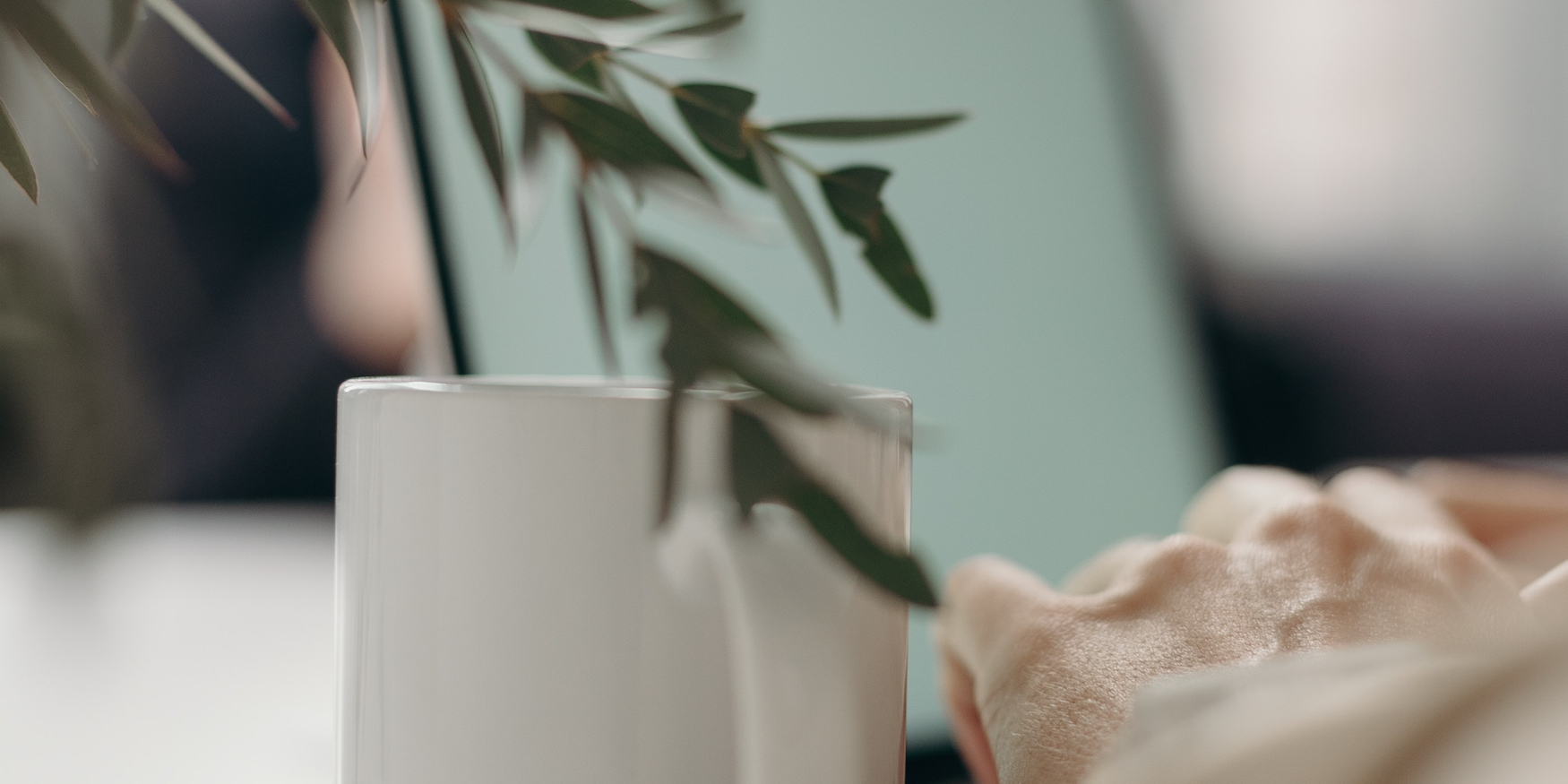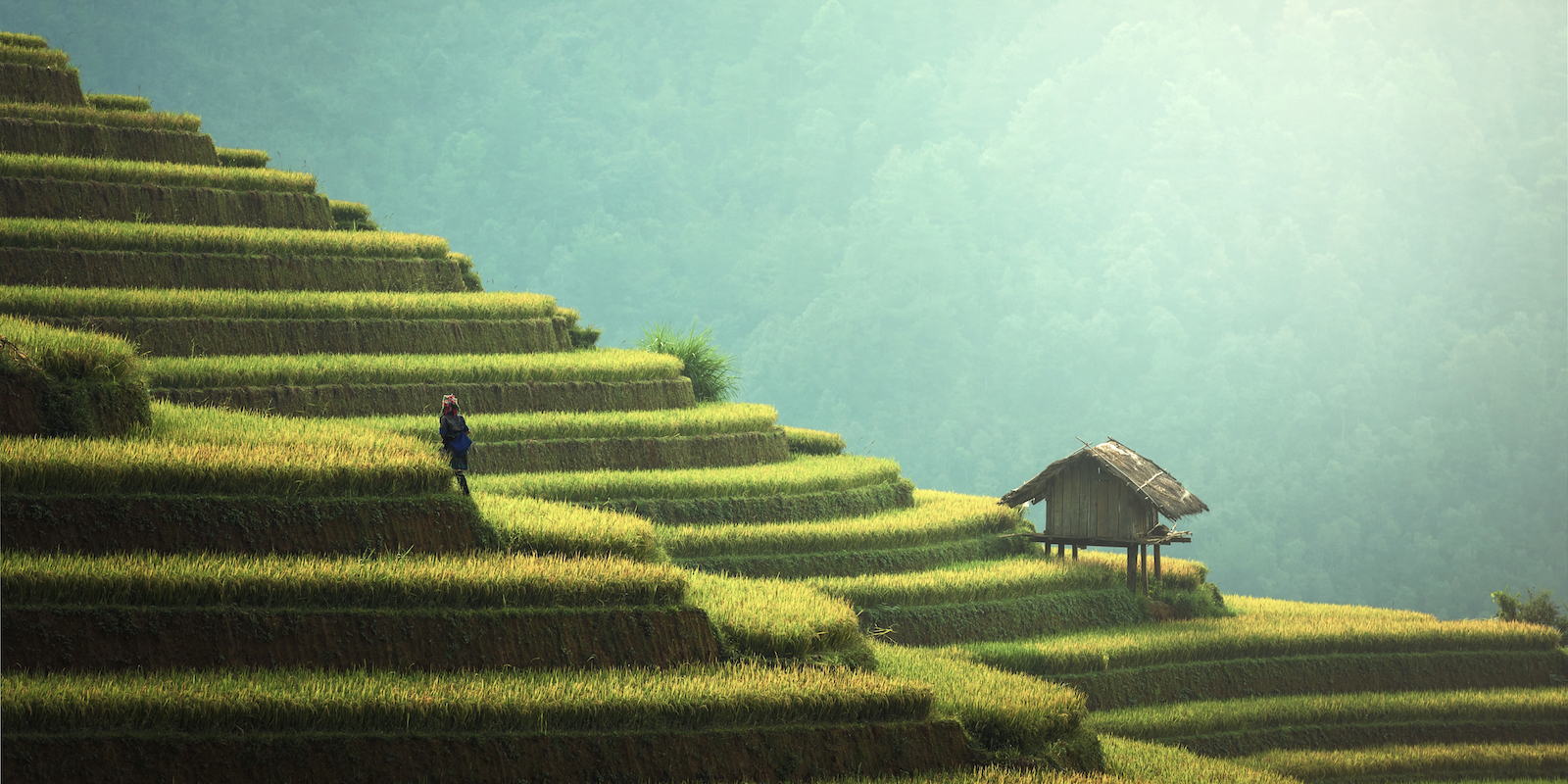After drought, fires and floods in regional Australia, we are now joining the world in facing another crisis. A virus called Severe Acute Respiratory Syndrome Coronavirus 2 (SARS-CoV-2) is being transmitted and causing the disease called COVID19 which is now a pandemic.
In another article I wrote about a Buddhist approach to mitigating climate change and reducing the suffering related to it, I emphasised the Buddha’s four noble truths including the eight-fold path. Today, I would like to continue to share the Buddha’s teachings as far as I understand them, in order to find ways to reduce the suffering associated with coronavirus. (For convenience sake in this article, I will call the virus, the disease and this pandemic simply, coronavirus.)
Buddha’s Four Noble Truths & How They Relate To Coronavirus
The Buddha’s four noble truths are:
- there is dukkha (Pali for un-satisfactoriness or suffering),
- dukkha has root causes (greed, ignorance and hatred),
- there is the reality of Nirvana or freedom from dukkha, and
- there is a path leading to freedom — the eight-fold path.
The four truths are often symbolised by a beautiful lotus growing out of the mud at the bottom of a pond. This analogy relates to how difficult and painful experiences can paradoxically transform to freedom.
Could coronavirus, which is causing suffering across the globe, be like the mud of a lotus pond? Could humanity and the social, economic and ecological systems we are part of blossom like a beautiful lotus that grows from the smelly compost at the bottom of a pond?
According to the Buddha’s four truths, where there is dukkha there is also the possibility for freedom. So, according to the Buddha, we can find psychological freedom even within this horrendous crisis. In what follows I will use the framework of the Buddha’s four noble truths to outline:
- some examples of the suffering related to coronavirus,
- ways that greed, ignorance and hatred are feeding into suffering at the individual level as well as at broader national and global levels,
- the possibilities for freedom from the suffering related to coronavirus at both the individual and global levels, and
- two meditation practices that may help in reducing the suffering of coronavirus.
1. There Is Dukkha With Coronavirus
Dukkha often refers to suffering. However, it is best understood as un-satisfactoriness. Dukkha occurs across a spectrum from gross and severe to mild, subtle and illusive. Managing this coronavirus pandemic has been compared to being at war. Just as with war, the diversity and range of human suffering associated with coronavirus is immense and horrific. We are all affected in some way.
Ageing, Sickness, Death And Grief Is Dukkha
At the date of writing this sentence (3rd of April 2020) there have been 1,015,877 confirmed coronavirus cases worldwide and 212, 993 cases recovered. There have also been 53,218 deaths. The health systems of Italy, Spain, the UK and the USA have been at breaking point. They lack respirators, personal protection equipment, medication and perhaps most importantly, front line health practitioners. Many of the health workers who care for the ill and dying are themselves being infected and dying. (Please note by the time this article was completed on the 1st of May 2020 there were over 3 million confirmed COVID19 cases, 1 million individuals recovered and 233,820 deaths worldwide due to COVID19.)
Death is dukkha, not only for the deceased but also for the ones left behind. Researchers estimate that for every elderly person who dies there would be 2.2 children and 4.1 grandchildren left to grieve (along with other relatives and friends). The grief and trauma that results from this pandemic could affect thousands. Some researchers are warning of a second pandemic of depression, anxiety and suicide resulting from coronavirus. Grief, sorrow and despair is dukkha.
Death Anxiety
Often in Western societies, we tend to deny ageing, sickness and death and prefer not to reflect on these realities. With coronavirus however, many people have been confronted with the reality of their own or their loved one’s mortality and this is anxiety provoking. Death anxiety is dukkha.
Economic Collapse & Loss Of Employment
Getting what we don’t want is dukkha. The threat of global economic collapse due to coronavirus is like that of the great depression. In Australia, the entertainment industry, the hospitality industry, tourism and the travel industry have all come to a grinding halt due to the restrictions required to stop the spread of coronavirus. Many other industries have also suffered as a result.
In Australia and across the globe, millions of people are unable to work and consequently pay for groceries, rent, mortgages, and basic living expenses. Fortunately, Australia has a welfare safety net, but for individuals and families of many countries, there are no social welfare systems and if there is no money there is no food.
Putting aside the basic needs for survival; being occupied with meaningful employment is a factor in good mental health and life expectancy. Prior to coronavirus, there were reports of a decline in life expectancy of US citizens and a surge in what is called “deaths of despair”. Through increased automation, outsourcing to the cheapest providers and other cost saving measures, the poor and disadvantaged become indebted, poorer and more disadvantaged. This situation has been linked to unemployment and debt leading to alcoholism, opioid overdoses, and suicide. With the current health crisis, the poor and disadvantaged are not only more vulnerable to coronavirus but also the mental health decline associated with poverty and unemployment.
Social Isolation
The necessary coronavirus restrictions contribute to suffering related to a lack of human connectedness. Human contact and connection are the very things we humans need when we suffer.
Sadly, many people have been cut off from family and friends except through social media and other technological and distant connections. Tragically, many of those dying such as the elderly, who are not so familiar with multimedia platforms, are dying without direct contact with their loved ones. At the time of death, we naturally want to be with the ones we love, to comfort them and be comforted ourselves.
Physical contact is essential for healthy emotional, mental and social development. From the cradle to the grave, we humans need other humans to survive, thrive, to rest and feel safe. In times of need, human contact can comfort and soothe emotional and physical pain. Our yearning to belong is so strong that even when we relax and engage in recreation, we do so in the company of others with activities such as sport, concerts, cafes and visiting friends. To socially isolate or distance goes contrary to our human nature. Feeling disconnected from family and community is dukkha.
Mental Health Implications
Without our normal social activities many of us are alone with our crazy minds and it is dukkha. When we are socially isolated, we may become more acutely aware of underlying and suppressed neuroses, anxieties, resentments, paranoia, fears, abuse, hurt and more. Even for trained and experienced meditators, the silent retreat experience is often difficult. During these times of social isolation our inner demons often come out of the mind’s shadows to show their faces. Research shows that some people who have been socially isolated because of epidemics are more vulnerable to feeling alone, stigmatised and developing mental health conditions such as depression, anxiety and post-traumatic syndromes.
Depression and anxiety are two quite common conditions that are likely to be triggered and or exacerbated with coronavirus. The generalised uncertainty about the future, loss of security, shortages, isolation, stress, health concerns, social, financial, job and lifestyle losses from coronavirus all provide the perfect conditions for mental health decline.
Another aspect of the stay at home edict is when we cannot be alone. For those who live in confined, crowded and densely populated places, the restrictions to stay at home could be triggers for social conflict, neglect and violence.
Read more: Learn about the effects self-isolation and quarantine can have on the brain.
When Papacca Hits
One factor that makes our mental health worse and becomes another source of dukkha is what in Pali is called papacca (pronounced papancha). Papacca is where one’s imagination goes wild. It begins with perceiving something and then through a proliferation of thinking processes, results in an imagined reality that is completely different from the original perception. In other words, we get stuck in our heads and lose contact with reality. With the overload of information about coronavirus it is easy for us to become lost in thinking. Rumination and worry are two examples of papacca. Worry involves us being consumed with the “what ifs” about an uncertain future and is often a frantic but ineffective attempt to think our way out of the uncertainty.
There is a difference between fear and anxiety. Fear is a natural response to danger and often helps us deal effectively with threats to survival. We need to act in response to our fears of coronavirus. This is healthy. Worry, however, focuses on problems rather than sustainable solutions. Worry feeds into anxiety and is dukkha.
Rumination is different from worry in that it focuses on the past or current untoward situations. It involves getting caught in cognitive (thinking) loops of mulling over, and over again about things that cannot be changed. Rumination is different from wholesome reflection. When we reflect we can objectively see problems, learn and heal from them and move on in helpful and productive ways. Rumination, on the other hand, narrow-mindedly focuses on failures, mishaps and misfortune. Rumination is linked with depression when we identify with and take personally negative thoughts, such as “I am hopeless, worthless and helpless”. In the coronavirus world, rumination hinders effective problem solving and action, and is dukkha.
Adjustments To Change
Whole societies have needed to adjust to a vastly different world as a result of coronavirus. For those fortunate enough to still have a job and those working from home the adjustments have been massive. These individuals have needed to learn how to work safely or to work online as well as, in many cases, home school their children.
The dramatic home life changes have been, to say the least, stressful for many people. Further to this we can no longer visit relatives, go on holidays and generally do what we want to do. We have lost many of our personal freedoms. In cultures that are accustomed to freedom, such as most Western cultures, we are used to immediate gratification of what we want when we want it. With coronavirus, clinging to our former lifestyle and not getting what we want is dukkha.
Explore various coronavirus anxiety resources on Insight Timer — from blog articles to talks and guided meditations.
2. The Origins Of Dukkha Related To Coronavirus
When we begin to wake up to the Buddhist second noble truth, we realise the origins of our dukkha are greed, ignorance and hatred. These forces also maintain and fuel dukkha by influencing the way we relate to others, life’s experiences and ourselves. In Pali, these mental, emotional and behavioural tendencies are called “kilesa”. Kilesa are considered distortions or poisons of the mind. They have been compared to toxic, non-native weeds that infest and take over the beautiful garden of our minds.
- Greed refers to craving, clinging, grasping after and addictions to pleasant experiences. Wanting is different from needing. Greed may involve wanting something even when we don’t need it. Sensual craving colours our perception so that we become blinded to the reality of the objects we crave for, grasp after and cling to. The reality of the things that we desire is that they are impermanent, empty of solid “thingness” and because they change, unreliable in providing enduring happiness. In Buddhism the realities of impermanence, emptiness and dukkha, are called the three characteristics or marks of existence. Not seeing them is one aspect of ignorance.
- Ignorance refers to not knowing, not seeing, not understanding and not perceiving the reality of things as they are. With this poison it is like we cover our vision with a veil and live in darkness. We tend to ignore the way things actually are and instead project our delusions onto the world and ourselves as the truth.
- Hatred refers to ill will, unnecessary avoidance, rejection, denial, condemnation, aversion and or aggression triggered by unpleasant feelings. This poison manifests in emotions such as frustration, impatience, resentment, boredom, agitation, rage and anger. It is divisive and works to isolate, separate and create disharmony.
Left unrestrained, the kilesa can infiltrate and influence our thoughts, emotions, moods, behaviour and our being, affecting everything we experience. The first verse of a classic Buddhist text called the Dharmapada, goes something like this:
With our minds we create our sense of self and the world around us. Approach and relate to a situation with an unwholesome mind (i.e. greed, ignorance and hatred) and suffering will follow, just as the wheel of a cart follows the hoof of the ox pulling it. Approach a situation and relate with a calm, bright and wholesome mind (i.e. one with generosity, wisdom and benevolence/compassion) then happiness will follow you as your shadow, unshaken.
Kilesa On A Personal Level
Much of our experience is completely out of our control. However, the way we relate to our experiences can impact on whether our dukkha increases or decreases and whether we can find freedom from it. For example, rumination is often driven by feelings of self-hatred. It will tend to focus on the worst and make incorrect statements about our identity such as “I am a failure” or “I am / we are all doomed”, which we then believe as fact. Unfortunately, our negative beliefs entrench our self-loathing and unrealistic perceptions of the world. Rumination unchecked can lead to a descending spiral of helplessness, hopelessness and worthlessness. Regarding coronavirus this only makes matters worse. As we will discover in the next section about the 3rd truth, however, if we can short-circuit ruminative processes and not believe untrue statements about ourselves, then we can prevent sinking into a quagmire of depression. We will also be able to act more effectively and compassionately in the face of coronavirus.
Coronavirus is unpredictable. We may begin to worry in an effort to avoid the extremely unpleasant experience of uncertainty. This involves frantic problem solving to find a way out. We may find a temporary solution, which is a relief. Unfortunately, superficial solutions are often not sustainable and with addiction to the temporary relief, we continue to feed into the worrying process. Not clearly seeing how we feed into the excessive thinking process we become bound in worry’s destructive cycles. If on the other hand, we could learn to tolerate the experience of uncertainty and understand it as a reality of life, then we may be more able to avert reactive cycles, think more clearly and approach coronavirus with wise and compassionate action.
Kilesa On National & Global Level
The kilesa not only cause and maintain suffering at an individual level, they also seem to infiltrate and fuel dukkha at national and global levels. Though factors related to the transmission of this virus are multi-layered and complex, the kilesa seem to be evident in global social, political and economic systems.
Our global social, political and economic systems are complex and interdependent. When through ignorance the strength of the economy has been put before the welfare of citizens, the resources for the necessary safety measures to protect us and our essential workers are in short supply. These ignorant actions could indirectly result in thousands of avoidable transmissions and deaths. Systems that encourage greed and grasping and reward the wealthy, leave people in poverty more vulnerable.
The belief that getting and owning what one wants, even if we don’t need it, leads to happiness is misguided. The problem with this belief is that when we don’t get what we want we become unhappy. Alternatively, if we do get what we want and then cling to it, we are ultimately unsatisfied because all things change. Often consumerism is driven by such beliefs. We are all dependent on each other in an interlinked demand and supply chain. The consumers demand and pay for goods and services, while the companies supply the goods often at a significant profit. Sadly, the reality is that profit is sometimes put before people, the rich get very rich and the poor get poorer and become more disadvantaged. The global market rewards competition and aggression. It favours private gain over public good. It values multi-million dollar per annum corporate executives more than essential workers, who are amongst the most poorly paid.
These imbalances ultimately undercut community health and wellbeing. Many health systems across the globe were simply unprepared for coronavirus, perhaps partly due to lack of adequate funding. When governments have a “user pay” health system accessibility to health services are compromised. When private health services adopt business models of profit before people then the quality is also compromised. Similarly, when public health services succumb to economic rationalism, the quality, capacity and capability of the service is also sacrificed. The lack of personal protection equipment, ventilators, testing kits and beds in ICU are just some examples of how some health systems are struggling due to greed. Ultimately everyone is put at risk especially health professionals trying to do their job of saving lives. Rather than being competitive, divisive and blaming others, it would be helpful for our world leaders to work together towards unity, cooperation and compassion.
Scientists have proposed that this new novel coronavirus may have been transmitted via illegal trafficking and markets in wild animals. Coronavirus is just one of the many viruses that have been transmitted from animals to humans. According to David Quammen of the New York Times, January 28, 2020:
“We invade tropical forests and other wild landscapes, which harbor so many species of animals and plants — and within those creatures, so many unknown viruses. We cut the trees; we kill the animals or cage them and send them to markets. We disrupt ecosystems, and we shake viruses loose from their natural hosts. When that happens, they need a new host. Often, we are it.”
It is true that some wildlife markets may have developed because of the need for protein and a livelihood. In these cases, there may be ignorance of the dangers and no viable alternatives. It seems, however, that when large companies, governments and other beneficiaries are motivated by kilesa we fail to see the subtle interconnections of nature and the need for ecological balance. We also indirectly exhibit disregard for native peoples and animal life and have no respect for or understanding of the ecological balance between animal and human boundaries.
According to some statistics individuals owning over $100,000 (US) in assets make up less than 11% of the global population but own 82.8 % of global wealth. Often the beneficiaries of profit for the rich economic systems are completely ignorant of the destructive impact their investments are making. Sometimes they are aware, but due to greed choose to ignore. Those of us who are wealthy enough to leisurely crisscross the globe with air travel, also need to bear some responsibility for the transmission of this virus. If we are honest with ourselves, most of this unnecessary travel is based on greed.
A letter written by an Indian doctor has been cited across social media. It reads as follows:
“Social distancing is a privilege – it means you live in a house large enough to practise it. Hand washing is a privilege too – it means you have access to running water,” “Hand sanitisers and soap are a privilege – it means you have money to buy them. Lockdowns are a privilege – it means you can afford to be at home. The most effective ways to ward off corona are accessible only to the affluent. In essence, a disease that was spread by the rich as they flew around the globe, will now kill millions of the poor.”
If we continue to feed into the dukkha of coronavirus with patterns of greed, ignorance and hatred, then we will only make the bad situation worse. If however we can relate to and approach this crisis with a heart of generosity, wisdom and benevolence/ compassion, then not only may we realise more hopeful egalitarian solutions for the globe, we might also realise psychological freedom for ourselves.
3. Freedom From The Suffering Of Coronavirus
In the article I wrote about Buddhism and climate change, I mentioned a principle called dependent arising. It is worth repeating here. The Buddha used dependent arising to explain how things arise and how they change and disappear. Though complex, this principle in often described simply in the suttas (the discourses of the Buddha) as follows:
“When this is, that is;
because this arises, that arises.
When this is not, that is not;
because this ceases, that ceases”
(Bodhi, B. (2000). The connected discourses of the Buddha: A translation of the Samyutta Nikaya. Somerville MA: Wisdom Publications. p.552)
The four noble truths provide an example of dependent arising. When there is craving and clinging, hostility and delusion (2nd truth) there is dukkha (1st truth). When there is no greed, ignorance and hatred and instead the practice of wisdom, ethics and meditation (the 4th truth) there is also no dukkha (the 3rd truth). The term used for “no dukkha” is Nirvana (Sanskrit) and this is the supreme aim and goal of the Buddha’s teaching. The principles used to arrive at Nirvana can also be applied to goals such as reducing the severity of the dukkha related to coronavirus.
We cannot prevent the realities of sickness and death. We can however understand, accept and be at peace with the inevitability of these truths. It is natural to fear and be genuinely concerned about coronavirus. We need to act on our fears. However, the unnecessary addition of suffering through excessive thinking can be reduced. If we no longer feed into and believe erroneous ruminations about ourselves and the world with coronavirus, then we may be less overwhelmed with depression and see and act effectively. Similarly, with worry, if we are more willing to accept the unpleasant feelings of uncertainty and not feed into ineffective worrying processes, then we may be less hijacked by anxiety and able to solve problems with sustainable solutions.
The four truths have a sequence. When one is willing to see deeply into dukkha (the 1st truth), then we begin to realise the root causes (the 2nd truth). When we can release the grip the kilesa have on us, then we realise freedom (the 3rd truth). When we wake up to the 3rd truth, we realise the path of practice (the 4th truth). The first stage of realising and practicing the way of freedom is understanding dukkha. In reference to the lotus analogy mentioned earlier, if there is no mud there is also no lotus. There are similarities with the sequence of the four truths and the saying that goes: every dark cloud has a silver lining.
As a clinical psychologist, I am very aware of the suffering of Post Traumatic Stress. This includes intrusive imagery, nightmares, anxious reactions, depression, hyper-vigilance and more. Psychologists are also becoming familiar with Post Traumatic Growth, which is where trauma becomes a stimulus for positive transformations. In one study, 43% of trauma survivors found that their lives had changed for the better after the trauma. They were more appreciative of relationships and life in general. They also found themselves being more present and compassionate.
The challenge of coronavirus has been compared to going to war and many governments have been put on a war footing. Despite wars being times of horrendous suffering, they are also times of altruism, courage and unity. During wars there are also major medical and technological advances, national self-reliance and resets on social, political and economic directions. In many ways, coronavirus may be a stimulus for Post Traumatic Growth at national and global levels. For example, political parties that are normally adversarial have worked together in bipartisan unity to do what needs to be done. The current Australian government that was once doggedly committed to having an economic surplus have made sweeping changes in welfare and provided financial assistance to businesses and the unemployed. Though temporary, it was done not only to support the economy but also to reduce the suffering of individuals and their families. It may be a step towards considering more egalitarian social and economic systems. One example of this is how homeless people have been housed in 4-star hotels during this crisis. Obviously, this is only short term but it may be one small step towards more compassionate consideration of the poor and disadvantaged across the world.
Unlike other pandemics where individuals were driven apart, there is evidence that with this pandemic compassion is replacing fear. Those health workers on the front line are being driven by compassion and the rest of the world is watching. Witnessing compassion is contagious as it inspires others to also act that way. Accounts of cooperation, compassion, generosity and kindness during this crisis are finding a place in news reports and the heroes of this pandemic are now health workers. Those in essential services such as teachers, child-care workers, supermarket employees and cleaners are receiving acknowledgement and gratitude for what they do. In comparison, the highly paid executive contributes little directly to the health and wellbeing of the community. Hopefully, this may indicate a shift in what our community considers valuable.
We humans are finding creative ways to meet our need to connect, and to belong in safe ways with friends, family, neighbours and the wider community. Across the globe there have been home based, street or drive by celebrations and commemorations. There have also been coordinated concerts, song and dance over the internet as well as in apartment blocks and in the open.
On Sunday the 5th of April, Queen Elizabeth II gave a moving speech to Britain. It was: “designed to reassure a nation struggling under the weight of a pandemic.” During this speech she said: “for those self-isolating, though it may at times be hard, many people of all faiths and of none, are discovering it presents an opportunity to slow down, pause and reflect in prayer and meditation”.
During the restrictions, I have conducted many online therapy sessions with patients in self-isolation. For many the isolation has been difficult. However, for those fortunate enough to have a supportive environment, they have found the time transformative. Many have said it has been time to consider what is important in their lives and clarify what they really need. Many have felt gratitude for what they have and inclined towards simplicity and contentment.
For many Buddhists, Nirvana has not yet been realised. Yet, it is a vision of possibility that gives us the energy, inspiration and confidence to continue on the path of awakening. Perhaps the possibility of something positive coming from this horrific and devastating crisis of coronavirus, may provide us with a direction to aspire towards.
4. A Way To Freedom
Traditionally the Buddha’s fourth noble truth refers to the noble eight-fold path. The eight factors on this path are divided into three groups:
- Wisdom: right view and intention,
- Ethics: right speech action and livelihood, and
- Meditation: right effort, mindfulness and concentration.
The aim of the eight-fold path is to reduce and uproot greed, ignorance and hatred and awaken to Nirvana. Meditation has two aspects: serenity and insight. Serenity slows down and cuts back on the growth of dukkha and insight uproots it.
There are hundreds of Buddhist meditation practices all of which lead to reduction and liberation from dukkha. In what follows I will describe just two of the many meditation practices that may be helpful for the suffering of coronavirus. These two practices are mindfulness of body and compassion. Mindfulness meditation is usually considered as an insight practice and technically, compassion is a serenity practice.
Mindfulness Of Earth Element In The Body
Mindfulness meditation involves remembering to see along with or to track experiences of body, mind and life, with attention. With mindfulness we begin to see clearly the three marks of existence, (impermanence, dukkha and not self or emptiness) and dependent arising. Mindfulness cultivates insight into the four truths, which includes the realisation of Nirvana. Mindfulness can also help to reduce the suffering of coronavirus. Traditionally there are four foundations of mindfulness:
- Body, including posture, actions, physical sensations and breath;
- Feeling, or the hedonic qualities of pleasantness, unpleasantness or neither;
- Heart-mind, including moods, emotions and states of mind in varying manifestations of greed, ignorance and hatred and their opposites;
- Phenomena, including emotional, mental and behavioural patterns considered as either wholesome or unwholesome.
Practitioners often begin with mindfulness of body practices because they tangible and easily accessible. Mindfulness of body is also a default practice for those with experience too. One example of a mindfulness of body practice is being aware of and tracking physical sensations. This can include earth element, which refers to the experiences of hardness, softness, pressure, heaviness and solidity. An added advantage of mindfulness of body is that by focussing on bodily experience it is easier to short circuit unhelpful thinking processes, such as worry and rumination. So long as there are not any untoward associations, being attentive to physical sensations can naturally orient the mind to being present with current realities rather than being lost in conceptual illusions. When we are confronted with the horror, angst, fear and dread of coronavirus, mindfulness of body practices can provide a refuge, a way of grounding attention, a way to short circuit unhelpful worries, ruminations and neurotic obsessions and a portal to the freedom of awakening.


- Grounding Attention In The Earth Element Of The Body Malcolm Huxter 15:21
Compassion Meditation
Compassion involves sensitivity to suffering and the commitment or wish to alleviate it. Compassion is a natural human response to witnessing suffering. It has three flows: self to other, other to self and self to self. Compassion is the direct opposite to and counteracts sadism, masochism, vengefulness, cruelty and high self-criticism. It also counters destructive and isolating shame. It helps to heal and ease pain and serves to connect us. It provides a direct connection to something greater than an isolated, contracted, lonely and separated self.
Buddhists also see it as one of the direct antidotes for the meditation hindrance of ill will and the affliction of hatred. As a meditation, this quality is cultivated and absorbed into. The effects ultimately flow in three directions as mentioned above. That is, towards oneself, towards others and within oneself. Compassion meditation increases the potentiality of compassionate actions in the world. Currently the world is in crisis and we are all suffering in some way or other. Each and every individual, every nation and all beings across the whole wide world need compassion.


- Compassion For The Suffering Of COVID19 Malcolm Huxter 18:38
- Transforming Ill Will And Emotional Pain To Loving Kindness Malcolm Huxter 18:06
Finishing Comments
We have had pandemics before, and we have recovered. The dangers of coronavirus are small in comparison to those of climate change. Perhaps this pandemic is providing a wakeup call to those who deny climate change. If the world responds to the insights of environmental science on climate change like it has done to those of medical science and coronavirus then we may see effective climate change action before it is too late. I hope so.
I began writing this article in mid-March 2020. Now in early May things have changed. Rates of coronavirus transmissions are slowing down in the developed world. The developing world, however, remains very vulnerable. I hope that the world can unite to help these populations and that in the long term coronavirus may be a stimulus for positive change. In regional Australia where only months ago we suffered horrendous fires, the rates of coronavirus transmission are particularly low. We are nonetheless encouraged to not be complacent because life is uncertain and everything changes. So, please keep your hands clean and hearts open. Though it may sound clichéd, we are all in this together and together we can compassionately bring an end to the dukkha of coronavirus.

